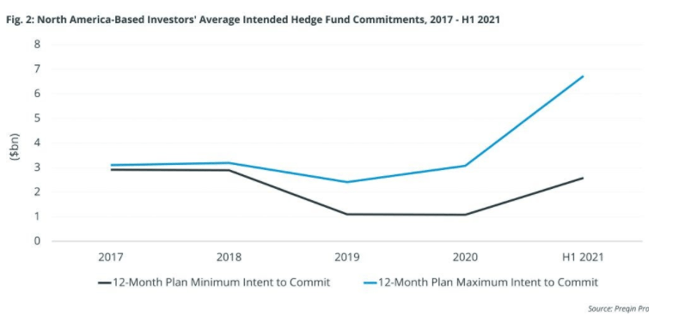The COVID-19 pandemic is still ongoing in many parts of the world, with the now-dominant Delta variant delaying its end and the resultant supply chain bottlenecks increasing fears of inflation. And let’s not forget that the Fed is signaling that the Taper Tantrum expected from the government’s bond-buying pullback is set to begin as soon as next month. Accordingly, investors will seek to further reduce portfolio risk, meaning hedge funds are expected to become increasingly crucial.
North America-based investors have increased planned commitments over the 2020-2021 period, reversing a previous downward trend (Fig. 2). This is to be expected, as historically allocations have trended upwards following economic downturns. If these commitment ambitions are met, it will lend further credence to the notion that investors are allocating more money to hedge funds to reduce the risk inherent in a volatile equity market.

Hedge funds can materially lower portfolio risk and help insulate capital from significant losses. Consequently, investors have determined, at least for the time being, that the high-risk macroeconomic environment jeopardizes portfolio returns, and alternative investment allocations can increase predictability and therefore increase returns. Going forward, more mass-risk events – be they climate disasters, pandemics, or political unrest – could further boost allocations to hedge funds, and perhaps permanently so.
Alternative investment allocations can increase predictability
Leading CIOs in the UHNW sector are moving more towards longer duration, compounding-oriented private investments. Indeed, while the illiquidity premium remains an important competitive advantage that UHNW investors can exploit across multiple products, there is still an inherent flaw. Most all hedge funds still invest in equities and cyclical, volatile asset classes.
Here’s where articles like these leave you hanging. That’s not how we roll. Here’s an idea you can use to earn multiples on your cabbage in absolute return style.
Most all hedge funds still invest in equities
Senior Life Settlements exist to multiply money and hedge risk. The illiquidity premium to investing in life insurance asset-backed securities is attractive because of the money multiplier effect. Put some in…get more out. That’s not always the case with other hedge funds that simply try to be on the right side of the trade-in chaotic markets. There’s no cyclicality or volatility to a life insurance policy. You’re buying future dollars at a discount today and it’s all backed by a legal contract.
Voila…The Money Multiplier Effect.


